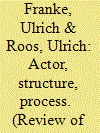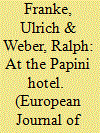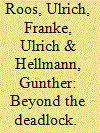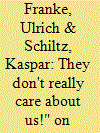|
|
|
Sort Order |
|
|
|
Items / Page
|
|
|
|
|
|
|
| Srl | Item |
| 1 |
ID:
100478


|
|
|
|
|
| Publication |
2010.
|
| Summary/Abstract |
The following article refers to the current debate about state personhood opened by Wendt's claim for a treatment of states as real persons in order to prevent the reductionist argument that states only are treated 'as if' they were persons. By understanding phenomena like states consistently as structures - as 'structures of corporate practice' - we argue that there is a possibility to escape from the situation dually framed by Wendt. This alternative is constituted by a tripartite pragmatist ontological model that consists of actors, structures of corporate practice, and processes. After having presented our view of the debate and its central problems in a first step, we will set forth our model and its implications for the study of international relations in a second and third step.
|
|
|
|
|
|
|
|
|
|
|
|
|
|
|
|
| 2 |
ID:
117915


|
|
|
|
|
| Publication |
2012.
|
| Summary/Abstract |
Pragmatism is ever more popular amongst those who study international relations. Its emphasis on practice is generally acknowledged as a defining characteristic. There is, however, a general tension within pragmatist thought concerning practice, for pragmatism may emphasize the theorizing of practice. It is, then, distinguished from other theories in International Relations (IR) such as neo-realism or constructivism as a contender in their midst. We delineate a pragmatist theory of IR in the first part of this article, but insist on going beyond merely establishing the next paradigm, for pragmatism may also emphasize the practice of theorizing. Theories are, then, considered different tools useful for dealing with the social world. This will be corroborated in the second part by a close reading of William James. Finally, we submit that instead of a paradigm war, a metaphor such as that of the Papini hotel is needed in IR - a metaphor that accounts for theory competition without neglecting the limitations set by the practice of theorizing itself.
|
|
|
|
|
|
|
|
|
|
|
|
|
|
|
|
| 3 |
ID:
080952


|
|
|
|
|
| Publication |
2008.
|
| Summary/Abstract |
Ever since it started in the early 1990s, the latest debate on United Nations Security Council reform has divided EU member states. This division has created a huge stumbling block for progress. It has also hampered the deepening of the EU's Common Foreign and Security Policy. This article discusses recent developments in both the UN and the EU. In particular, it sketches out how the EU can become a key power broker by reconciling the conflicting Italian and German positions towards a common European UN policy. The creation of semi-permanent SC seats seems to be the most promising solution in the short term. Moreover, such an interim approach also promises to achieve a single EU seat in the long run.
|
|
|
|
|
|
|
|
|
|
|
|
|
|
|
|
| 4 |
ID:
119408


|
|
|
|
|
| Publication |
2013.
|
| Summary/Abstract |
Both political activism by pop musicians and the discussion of popular culture in international relations (IR) have been on the rise in recent years. A closer look at the political meaning of mainstream pop songs, however, is still missing. Therefore, we examine the political worldviews that become manifest in the lyrics of US and German top ten hits from 1960 to 2009. A remarkable feature of these worldviews is the rejection of political institutions and actors in a mood of alienation and disenchantment, along with a strong appeal to the responsibility of individuals to autonomously tackle societal deficiencies. This appeal is based on a pronounced trust in people's capacity to solve problems jointly and without any interference by institutionalized politics. In this context, the growing recognition of political activism by so-called celebrity diplomats may be linked to these worldviews. Reflections on normative implications of the political worldviews, in turn, raise delicate questions about legitimate agency and the way public affairs are organized.
|
|
|
|
|
|
|
|
|
|
|
|
|
|
|
|
|
|
|
|
|